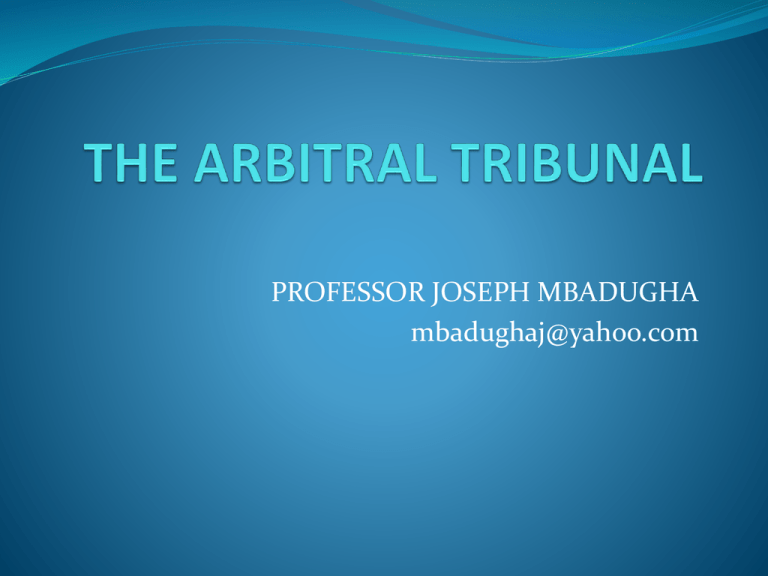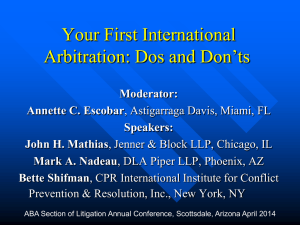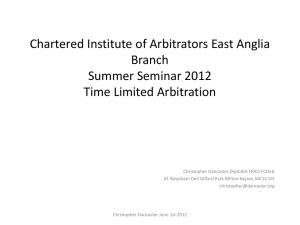THE ARBITRAL TRIBUNAL
advertisement

PROFESSOR JOSEPH MBADUGHA mbadughaj@yahoo.com OUTLINE INTRODUCTION COMPOSITION AND SELECTION OF ARBITRATORS CONSTITUTING THE TRIBUNAL CESSATION OF OFFICE REMOVAL OF AN ARBITRATOR REPLACEMENT OF AN ARBITRATOR CHALLENGING JURISDICTION CONCLUSION INTRODUCTION Arbitral tribunals are not permanent institutions It must be constituted for every case and dissolves on determination of each case No competent arbitral authority to decide a dispute that has arisen until constituted Arbitrators are the indispensable condition of the arbitral process COMPOSITION This Refers to the number of arbitrators to be appointed Parties are to determine the number of arbitrators If no agreement by parties, the number will be determined by the applicable institutional rule or law -Article 10(1) & (2) UNCITRAL Model Law provides that in the event of parties’ failure to determine the number, it shall be three; see also Article 8(2), ICC Arbitration Rules No limit to number of arbitrators that parties may agree to appoint Even number like 2, 4 etc is not advisable because of likelihood of deadlock Some national laws imputes a presumption of an additional arbitrator as chairman or umpire if the parties agree to appoint even number of arbitrators SELECTION AND INTERVIEW Quality of arbitration depends on the quality of arbitrators Factors to consider in choosing an arbitrator: -expertise in the subject of dispute -knowledge and experience in arbitral proceedings Interview -necessary to interview a potential arbitrator Reason for interviewing -to assess the independence & physical fitness -to ascertain whether he possesses requisite knowledge, skills and experience - To determine suitability and availability Separate or joint interview -if a sole arbitrator, to be interviewed jointly by parties and if a party arbitrator to be interviewed separately by the appointing party CONSTITUTING THE TRIBUNAL appointment follows after notice of arbitration and appointment can be made by: the parties arbitral institution or appointing authorities existing arbitrators Courts BY THE PARTIES Parties to agree on appointment of arbitrator Parties to agree on the procedure for appointing arbitrator(s) inclusive of the Chairman If there is no agreement and no body is designated to appoint, an arbitral institution or a court appoints by reason of the applicable rule or law --Article 11(2)&(3) UNCITRAL Model Law, Section 16(1)-(5), English Arbitration Act 1996 Procedure of appointment --a sole arbitrator - list procedure --party appointed arbitrator –no procedure to be agreed, each appoints its own arbitrator Parties to inform an arbitrator of his nomination BY ARBITRAL INSTITUTION OR APPOINTING AUTHORITY By arbitral institution whose rules governs the arbitration By persons, professional bodies, trade associations or arbitral institutions designated by the parties as appointing authority. --see Article 6(1) UNCITRAL Arbitration Rules Designating an appointing authority is more appropriate in adhoc arbitration particularly in a sole arbitrator It is advisable to obtain prior approval, willingness and readiness to act as an appointing authority from the intended authority before designating it as so. BY ARBITRAL INSTITUTIONS OR APPOINTING AUTHORITY 2 Procedure of appointing arbitrators may vary from one arbitral institution to another Sole arbitrator by arbitral institution UNDER LCIA --a sole arbitrator shall be appointed unless parties agreed otherwise in writing or LCIA determines it shall be 3 in view of the circumstances --to appoint the tribunal as soon as practicable after receipt by registrar of the response or 30 days after service of the request on the respondent if no response is received by the registrar or such lesser period fixed by LCIA -appointment of an arbitrator(s) by parties or third party pursuant to parties’ agreement is treated as a nomination under LCIA Court and such a nominee can only be appointed by LCIA subject to his complying with Article 5.3 of the LCIA Rules of Arbitration --LCIA may refuse to appoint any nominee if it determines that he is not suitable or independent or impartial --See Articles 5.3, 5.4 and 7.1 of the LCIA Arbitration Rules BY ARBITRAL INSTITUTIONS OR APPOINTING AUTHORITY 3 Under ICC --ICC Court to appoint a sole arbitrator if there is no agreement on number of arbitrators except it appears to the Court that 3 is suitable If the parties agreed on a sole arbitrator, they may nominate one for ICC Court’ confirmation If the parties fail to nominate within 30 days from the date the other party received from the claimant the request for arbitration or within such additional time as may be allowed by the secretariat, the ICC Court shall appoint a sole arbitrator --Article 8(3) ICC Rules of Arbitration, 1998 BY ARBITRAL INSTITUTIONS OR APPOINTING AUTHORITY 4 Three Arbitrators Under ICC --each party to nominate in its request for arbitration and answer thereto one arbitrator for confirmation --if a party fails to nominate its arbitrator, the appointment shall be made by the ICC Court --the 3rd arbitrator (the chairman) shall be appointed by the ICC Court unless the parties agreed upon another procedure and any 3rd arbitrator nominated pursuant to such procedure is subject to confirmation by ICC Court --should such procedure fail, the 3rd arbitrator shall b appointed by the ICC Court --Article 8(4) ICC Rules of Arbitration BY ARBITRAL INSTITUTIONS OR APPOINTING AUTHORITY 5 Under LCIA -- if parties agreed that each nominates an arbitrator and either delays or fails, the LCIA Court may make the appointment without regard to any late nomination --the chairman shall be nominated by LCIA Court --Articles 7(2) and 5(6) LCIA Rules of Arbitration There is slight differences in LCIA and ICC appointment procedures Condition Precedent to appointment by an institution or appointing authority --a written request by either parties to the arbitration informing it that a dispute had arisen between the parties within the context of the agreement and the request must contain the following: A. Names and addresses of the parties to the arbitration agreement and to the dispute B. Reference to the underlying contract from which the dispute arose BY ARBITRAL INSTITUTIONS OR APPOINTING AUTHORITY 6 C . Reference to the arbitration agreement or a contract containing the arbitration clause D. A brief statement describing the nature and circumstance of the dispute and the claims E. A statement of any matter such as the seat or language of the arbitration if agreed by the parties and if not agreed the statement should state so F . The number of the arbitrators or their qualification which the parties have already agreed in writing or in respect of which the claimant wishes to make a proposal BY EXISTING ARBITRATORS Applicable in a 3 man arbitration Some arbitration agreements, institutional rules and laws provide that parties shall each appoint an arbitrator and the arbitrators appointed by the parties appoint a 3rd arbitrator, the chairman --See Article 11(3)(a), UNCITRAL Model Law, 2006 Parties tend to liason with the arbitrator they appointed in choosing a 3rd arbitrator However, the decision of who to appoint lies between the two arbitrators despite the contribution of the parties that appointed them as they are not bound by the suggestion of any party that appointed either of them BY THE COURT Courts’ jurisdiction arises when an arbitration is not institutional and: 1. The parties did not agree on an appointment procedure and under the law of the country governing the arbitration: a. the parties failed to appoint an arbitrator b. the two arbitrators who were each appointed individually by each party failed to appoint the 3rd arbitrator c. In a 3 panel arbitration either of the parties failed to appoints its own arbitrator 2. If under an appointment procedure agreed by the parties: a. a party fails to act as required under the procedure b. the parties or the two arbitrators failed to reach an agreement as required under the procedure c. a 3rd party including an appointing authority failed to act as required under the procedure d. any alternate means for securing the appointment provided by the appointment procedure failed See Article 11(3)- (4) UNCITRAL Model Law, 2006 BY THE COURT 2 Exercise of the jurisdiction arises upon an application on notice to the court by one of the parties The application must be supported by an affidavit evidence Time for making the application It varies from jurisdiction to jurisdiction but under UNCITRAL Model Law: 1. In a 3 arbitrators it must be: a. made within 30 days of a party’s receipt of a request to appoint an arbitrator but failed to do so b. made within 30 days of appointing the two arbitrators and they failed to appoint or agree on the 3rd arbitrator 2. In a sole arbitrator, it must be made when the parties fail to agree on the arbitrator BY THE COURT 3 In making the appointment the court shall have due regards to the parties agreement as to any qualification required of the arbitrators and such other circumstances likely to secure the appointment of an impartial and independent arbitrator Any decision of the court regarding the appointment of an arbitrator is not subject to appeal --See Article 11(5) UNCITRAL Model Law If the Court disregards the parties agreement as to qualification of an arbitrator, it may be a ground for challenging an arbitrator ACCEPTANCE OF APPOINTMENT Upon being contacted and nominated, an arbitrator must confirm his acceptance in writing to the parties In that letter, the arbitrator will: a. State his impartiality and independence b. Disclose any conflict c. His availability --See Article 12, UNCITRAL Model Law, Article 9(1), ICC Rules of Arbitration Contract Between Parties and the Arbitrator(s) Upon acceptance, an entirely new contract comes into being between the parties and the arbitrator(s). Subsequently, they agree on its further terms The further terms may include remuneration and expenses of the arbitrators, deposit and immunity from suit Thereafter, an agreement embodying the terms is prepared and executed by the parties and the arbitrator(s) POWERS OF AN ARBITRAL TRIBUNAL Powers of every arbitral tribunal are conferred on it by the parties within the limits permitted by the applicable law and by operation of law and these include power to: a. rule on its jurisdiction, (b)conduct the proceedings c. order production of documents, (d) appoint experts e. inspect the subject matter of the dispute f. receive evidence , (g) order disclosure of documents h. decide procedural and evidential matters i. make provisional orders and to render an award j. correct an award and act in case of a party’s default DUTIES OF AN ARBITRAL TRBUNAL Arbitrators duties which are imposed by law, parties’ agreement and institutional rules includes: a. to act fairly and judicially: –to act fairly means to treat the parties equally at all times and to give each party a full opportunity of presenting its case and meeting that of its opponent –see article 18, UNCITRAL Model Law 2006 -to act judicially means to respect and observe due process. It also means applying and administering justice b. Impartiality and independence -the duty of impartiality starts from the time a person is approached in connection with an appointment as an arbitrator-see article 11, UNCITRAL Arbitration Rules - the requirement of impartiality is a principle of natural justice -impartiality refers to a state of mind of the tribunal in relation to the issues and the parties in a particular case; and the word impartial connotes absence of bias, actual or perceived DUTIES OF AN ARBITRAL TRBUNAL 2 Bias could be defined as a predisposition or a preconceived opinion that prevents a person from impartially evaluating facts that are presented for determination; or in a nutshell it is prejudice. Bias may be actual or apparent -actual bias is the existence of a state of mind that leads to an inference that the person will not act with entire impartiality. Examples includes prejudice, being partial, having a financial interest in one of the parties or being interested in the outcome of the case -apparent bias is the existence of a situation or circumstance which gives rise to reasonable apprehension that an arbiter has been or may be biased against a party in a dispute submitted to him for determination DUTIES OF AN ARBITRAL TRBUNAL 3 Test for determining bias Bias is a state of fact and must be viewed and resolved objectively Applicable principle in determining bias is whether a reasonable and informed minded member of the public knowing all the facts would have a reasonable suspicion that a fair trial was not possible. In some jurisdiction the text is the same for both judges and arbitrators whilst in some they insist that a strict or less standard be applied to arbitrators DUTIES OF AN ARBITRAL TRBUNAL 4 Independence: Every arbitrator must be independent of the parties, disputes and issues arising therein Independence in this context means there is no actual or past dependent relationship or connection between the parties and the arbitrator which may or at least appear to affect the arbitrators freedom of judgment Where there is a connection between an arbitrator and a party, in other to know if that affects independence of the arbitrator, that connection will be tested against the following principles: 1. Proximity- how closely connected is the arbitrator to one of the parties by reason of the alleged connection 2. Intensity of interaction- more intense and frequent interaction as a result of the relationship more probability of that affecting the independence of the arbitrator DUTIES OF AN ARBITRAL TRBUNAL 5 3. Dependence- to what extent is the arbitrator dependent on one of the parties for benefits or advantage as a result of the connection 4. Materiality-are the benefits or the advantages accruing to the arbitrator as a result of the relationship significant? > C. Conduct the arbitration properly >. D. Avoid unnecessary delays and expenses –Article 17 Uncitral Arb Rule >. E. Disclose any circumstance likely to give rise to justifiable doubt as to his impartiality or independence. This duty is continuous until determination of the dispute --See article 12(1) UNCITRAL Model Law 2006 Consequences for breach of these duties --removal of arbitrator and repayment of fees; setting aside an award 0r remit the award to the tribunal for retrial CESSATION OF OFFICE death resignation revocation of arbitral tribunal’s authority or appointment-applicable if appointed through defective procedure or not in accordance with the applicable appointment procedure. REMOVAL OF AN ARBITRATOR >Procedure: usually provided by the applicable rule or law or by parties agreement. Procedure under Article 13 of both the UNCITRAL Model Law 2006 and UNCITRAL Arbitration Rule 2010 are a. The parties are to agree on the procedure failing which: a. b. c. d. a party challenging shall give notice of his challenge within 15days after he was notified of the appointment of the challenged arbitrator or give notice within 15 days after he became aware of the circumstances likely to give rise to justifiable doubt as to the challenged arbitrator’s impartiality or independence The notice must be served on the tribunal including the arbitrator being challenged and to all the parties as well --see also Article 10.4, LCIA Arbitration Rules; Article 11(3) ICC Rules of Arbitration REMOVAL OF AN ARBITRATOR 2 Grounds for removal If an arbitrator does not possess qualification agreed by the parties Incapacity and failure to act If circumstances exist that gives rise to justifiable doubt as to his impartiality or independence -see Articles 12(2), UNCITRAL Model Arbitration Law 2006; Article 11 ICC Rules of Arbitration Note: Even if a doubt exist, it must be justifiable and the test of whether a doubt is justifiable are the same with that stated under duties of arbitrator REPLACEMENT OF AN ARBITRATOR > Death, resignation, revocation of appointment and removal of an arbitrator create vacancy and may lead to the following questions: a. Will the arbitrator be replaced? b. If replaced, will the proceeding or part that was conducted before the replacement be repeated? --See Article 12(4) & (5), ICC Rules of Arbitration, Article 14(2) & (15) UNCITRAL Arbitration Rule > REPLACEMENT by the parties’ agreement same procedure used in appointment --See Article 14(1)&(2) UNCITRAL Arbitration Rule Removal and replacement of an arbitrator occasion delay and costs CHALLENGING JURISDICTION The jurisdiction of arbitral tribunal may be challenged on any of the following a. b. c. d. a. b. c. ground: Invalidity of an arbitration agreement A claim being outside the scope of the agreement Inarbitrability and lack of locus standi Tribunal exceeding the scope of its authority Time for Raising Objection to Jurisdiction Not later than the submission of statement of defence As soon as its discovered the tribunal is exceeding its authority Tribunal may admit a late challenge if it considers the delay justified Whether jurisdiction can be challenged at enforcement stage --An issue of jurisdiction must be raised before the arbitral tribunal in a manner provided by the law or rule of arbitration otherwise the party will be deemed to have submitted to jurisdiction CONCLUSION ARBITRATORS ARE THE SIN QUA NON OF THE ARBITRAL PROCESS. NO ARBITRATION WILL ARISE BEYOND THE QUALITY OF THE ARBITRATORS. THEREFORE CARE SHOULD BE TAKEN IN SELECTING ARBITRATORS. THANK YOU!!








